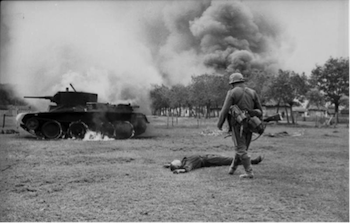

|
Operation Barbarossa  Germans take a Soviet village On the morning of Sunday 22 June 1941, 3.2 million German troops began the invasion of the Soviet Union along a 2,900 kilometre front. Luftwaffe planes bombed Russian cities and caused havoc in the Soviet defences, opening the way for the 19 Panzer divisions and 15 motorized infantry divisions that spearheaded the attack, known as Operation Barbarossa. Hitler's victories in western Europe had encouraged his hubristic plans. The Führer presented the invasion as a crusade against Bolshevism but in reality it was a race war for land and raw materials, especially food and oil, desperately needed by the German military in 1941. Hitler had always wanted to invade the Soviet Union. In Mein Kampf (1925) he had claimed that it was Germany's destiny to 'turn East' for 'Lebensraum' ('living space'). In the Nazis' racist ideology the Soviet people were 'sub-human' Slavs ruled by 'Jewish Bolsheviks'. The German assault was so powerful and swift that it took the Soviet forces by surprise. The Soviet defences were in disarray. Stalin had ignored intelligence reports of German preparations for an invasion. Even the last-minute reports of a massive German build-up on the frontier he dismissed as a British ploy to lure the Soviet Union into war (he had the bearers of this information shot as 'British spies'). By 28 June, German forces had advanced in a huge pincer movement through Belorussia to capture Minsk, 300 kilometres into Soviet territory, while further north they had cut through Lithuania and Latvia to threaten Leningrad. The Soviet press suppressed news of the German breakthrough. Rumours spread and people started to panic. It was said that the government had fled; that there was treason in the army staff; that the Soviet government was preparing to abandon Moscow and Leningrad. |
© 2014 Orlando Figes | All Rights Reserved